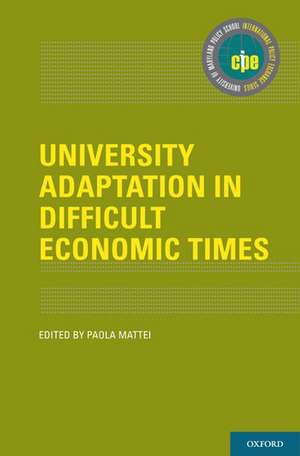University Adaptation in Difficult Economic Times
Editat de Paola Matteien Limba Engleză Hardback – 29 mai 2014
Preț: 466.13 lei
Preț vechi: 645.51 lei
-28% Nou
Puncte Express: 699
Preț estimativ în valută:
89.19€ • 93.38$ • 73.80£
89.19€ • 93.38$ • 73.80£
Carte tipărită la comandă
Livrare economică 26 martie-01 aprilie
Preluare comenzi: 021 569.72.76
Specificații
ISBN-13: 9780199989393
ISBN-10: 0199989397
Pagini: 224
Ilustrații: 7 B&W line drawings
Dimensiuni: 239 x 163 x 28 mm
Greutate: 0.42 kg
Editura: Oxford University Press
Colecția OUP USA
Locul publicării:New York, United States
ISBN-10: 0199989397
Pagini: 224
Ilustrații: 7 B&W line drawings
Dimensiuni: 239 x 163 x 28 mm
Greutate: 0.42 kg
Editura: Oxford University Press
Colecția OUP USA
Locul publicării:New York, United States
Notă biografică
Paola Mattei (Ph.D. London School of Economics) is a Fellow at the European Studies Centre at St Antony's College, University of Oxford, and University Lecturer in Comparative Social Policy. Her research examines comparative welfare reforms, health care and comparative education policy reforms. She has published numerous articles on these subjects, as well as two books: Restructuring Welfare Organisations in Europe: From Democracy to Good Management? (Palgrave 2009) and Welfare Governance Reforms and Effects in the Post-Golden Age (Routledge 2010), edited with K. Voerhest. She is the Principal Investigator of an international research project on Welfare Reforms and Accountability (funded by the Norwegian Research Council).












